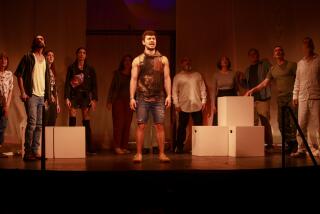A Provocative ‘Gluckel of Hameln’
- Share via
It’s a shame that “The Memoirs of Gluckel of Hameln,” which played Tuesday and Wednesday at the Los Angeles Theatre Center’s Theatre 2 as part of the citywide Yiddishkayt! Festival, has already closed.
Created and conceived by Jenny Romaine, Adrienne Cooper and Frank London, this surreal and thought-provoking production, based on the actual memoirs of a 17th century German Jewish woman, deserves a longer run and a wider audience.
Born in Hamburg in 1647, Gluckel married at the age of 14 and moved to Hameln, where she raised 12 (count them, 12) children with her devoutly religious husband. Upon his death, Gluckel took over the far-ranging family businesses, achieving success unprecedented for one of her religion and gender.
That’s the nub of the story, but it has been transmuted here into something more than the saga of one woman, however courageous. A melange of music, puppetry, song, folklore and contemporary humor, “Gluckel” is that rarest of gems in the contemporary theater--a genuinely avant-garde piece based on a sound philosophical foundation.
Scratch the surface, and you will find yet another rich level of meaning. When Gluckel marries, a rendering of Rembrandt’s “Jewish Bride” is displayed. A chillingly anti-Semitic song is based on the writings of Martin Luther. In “Gluckel’s Nightmare,” the most visually stunning sequence, a towering, masked Luther (agile Claire Dolan) dances on stilts, while a huge, rooting puppet hog cavorts onstage.
Director Romaine, a founding member of Great Small Works, the New York-based collective that produced the show, shares the role of Gluckel with Cooper. Cooper wrote the lyrics to the wonderful ballads, which she herself sings in a rich contralto. London’s music, which he also chiefly performs, whimsically punctuates the action. Instruments range from a toy piano to a hotel desk bell.
Michael Wex’s translation retains much of the original Yiddish, with a smattering of German thrown in. Sometimes, the Yiddish speeches are repeated in English, sometimes not.
Whatever the language, this vivid theatrical event transcends cultures and bespeaks the commonality of the human experience. Now, for that longer run.
More to Read
The biggest entertainment stories
Get our big stories about Hollywood, film, television, music, arts, culture and more right in your inbox as soon as they publish.
You may occasionally receive promotional content from the Los Angeles Times.










